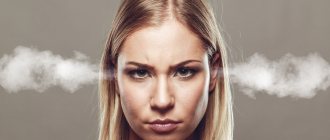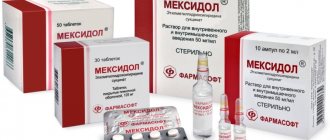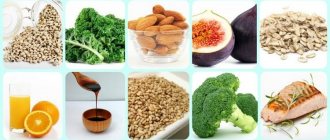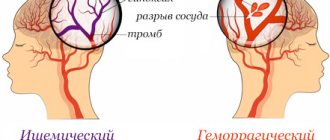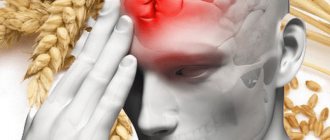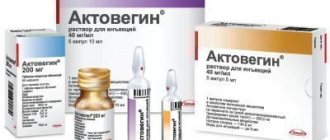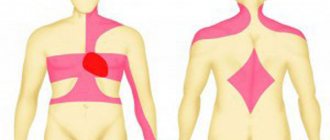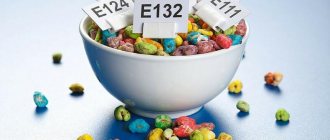Late autumn and early winter is a time of causeless blues, loss of strength and depression. There are few sunny days, and the sun only comes out when many people are sitting in the office. Cold, darkness, spring and summer are still very far away... all this depresses and upsets us, many are in a bad mood. A balanced diet will help you overcome this unpleasant condition.
The most important element for a good mood and a fighter against seasonal depression is the joy hormone serotonin. Our body produces it independently from the amino acid tryptophan; it must be obtained from food. It is found in chocolate, protein foods, fatty fish, and nuts.
Article on the topic What to eat in winter to avoid freezing and stay slim
Minerals and vitamins help the synthesis of tryptophan, for example, B vitamins, vitamin C, magnesium, zinc... Foods containing all these substances must be included in your diet daily - for example, brightly colored vegetables and fruits, legumes, brown rice, eggs, poultry, grains and dairy products.
By the way, we need tryptophan not only as a semi-finished product of serotonin. This element itself relieves insomnia and nervous tension, reduces irritability, fights depression, and increases performance. This amino acid is very important for people who are overweight; it normalizes appetite and reduces hunger. Products containing tryprofan are indispensable in the treatment of eating disorders: anorexia and bulimia.
Another very important element for combating seasonal depression is vitamin D. In the warm season, we spend more time in the sun, and our body synthesizes this vitamin. But in autumn and winter, you need to compensate for its deficiency with proper nutrition. Vitamin D is found in fish, eggs, beef liver, and dairy products.
Orange and red vegetables and fruits
Pumpkin, oranges and tangerines, bell peppers, carrots and beets - all brightly colored vegetables can put you in a good mood. After all, they contain a lot of vitamins, for example, citrus fruits are rich in vitamin C, which the body needs to process amino acids contained in animal proteins into the joy hormone serotonin. Vegetables and fruits also contain bioflavonoids, which improve blood circulation in the brain. Consequently, more oxygen and nutrients enter the brain, increasing vigor and good mood.
7 most useful products of October>>>
What food is best to avoid?
Reduce your consumption of these products as much as possible, and if possible, give them up altogether.
- Baking with yeast.
- Strong alcohol. It does not solve, but masks problems, and in moments of apathy it quickly becomes addictive.
- Sweets, carbonated drinks.
- Products containing large amounts of chemical additives and trans fats.
- Strong tea and coffee. If depression is accompanied by sleep disorders, then these drinks will do double harm.
- Spread, margarine, and mayonnaise worsen overall health and accelerate the development of depressive moods.
- Semi-finished products and low-quality sausages are the enemy of a good mood.
- Fatty meat and animal fats.
- Low quality purified water with impurities of chlorine, fluorine or metals.
- Preservation with the addition of vinegar and a lot of salt. It is better to replace it with products that have undergone natural fermentation or fermentation.
These products are antipodes to natural antidepressants. They cause worse mood and slower brain function.
Shrimp and other seafood
They contain iodine, without which proper metabolism and good mood are impossible. Iodine also affects performance and brain activity. The most iodine is found in seaweed, but other seafood should not be forgotten, especially since shrimp, for example, contain B vitamins and vitamin D, which is very important for winter.
20 simple tricks for working with seafood>>>
Other Important Products
Experts recommend consuming other healthy foods that help improve your mood . Nuts, seeds, seaweed and mustard will help eliminate the effects of stress :
- Nuts and seeds (pumpkin, sunflower). The seeds contain B vitamins and omega-3; these substances normalize brain function, stabilize the nervous system, reduce emotional stress, and improve sleep. It is useful to consume dried seeds, as some of the vitamins are lost during roasting. Nuts contain alpha-linolenic acid, melatonin, vitamin E, Omega-3, tryptophan, vitamin B6 and selenium. The combination of these elements activates the brain and helps the body cope with various stressful situations.
- Sea kale (kelp) contains B vitamins, they help normalize the functioning of the adrenal glands and produce adrenaline, improve the quality of sleep, and eliminate feelings of anxiety and apathy. Algae is sold canned or fresh, and soothing decoctions and infusions can be prepared from dried kelp.
- Mustard. Its use promotes the production of serotonin. Mustard is used for pickling foods, dressing salads and as an additive to meat dishes. One teaspoon of seasoning per day will save the body from stress and return it to a surge of strength. Mustard can be replaced with hot pepper and horseradish; these products also improve your mood.
There are many products that can relieve the body of stress, depression and increase its defenses.
But it is advisable to eat high-quality seasonal vegetables and fruits.
Spices
Nutmeg, green cardamom, star anise are the main spices for the cold season. They will not only warm you up, but also create a cozy, peaceful atmosphere, help you relax and get rid of stress. But you should be careful not to consume spices in large quantities. It is best to add a pinch to warm milk or herbal tea.
Spices instead of vitamins>>>
How to eat properly when depressed: what to eat if your nerves are exhausted
Not only external stimuli, but also our diet can lead to deterioration of the condition, causeless melancholy and sadness. Look at what you eat.
- Your menu should have enough fresh fruits and vegetables, legumes.
- Don't forget about whole grains, rice, lentils and other fiber-rich foods.
- Eat more fish, add flax seeds to cereals and desserts - these are important sources of polyunsaturated fatty acids that will help you cope with loss of energy and lack of mood.
We often remind you that dieting is stressful for the body. We will repeat this time, since most methods based on restrictions and prohibitions are also bad because they lead to a decrease in tryptophan consumption and a shortage of protein foods on the table. It is not surprising that such changes have a negative impact on the mental health of those losing weight.
Also, if you are depressed, it is recommended to avoid various stimulants:
- strong tea;
- coffee;
- energy drinks;
- cigarettes;
- sugar and sweets.
Taken together, all these components of an unhealthy diet can cause anxiety, sleep disturbances, and a sharp transition from joy to worry and sadness.
Chocolate
It’s no wonder that cocoa is the most popular drink of autumn. This is because cocoa beans contain a very large dose of tryptophan. They also have the caffeine boost to help you wake up from your hibernation and get into action.
Bitter or milky. Which chocolate is the healthiest?>>>
What will help enhance the effect?
In addition to eating a balanced diet with healthy foods and drinks, to prevent depression, consider the following recommendations:
- Walk more in the fresh air;
- Don’t isolate yourself, communicate with people and share your problems;
- Play sports or go for walks; physical activity is an essential condition for improving well-being;
- Get a good night's sleep and try not to get nervous. You can find out what to do if you suffer from insomnia here.
- If you feel that the condition is getting worse and you can no longer cope with it on your own, seek help from a doctor.
You can find out a specific list of symptoms that indicate that you should seek professional help immediately here: this article also contains practical recommendations for overcoming depression on your own.
Pay attention to your health and mood. Any disorder or disease is easier to prevent than to cure.
General rules
Depression , as defined by WHO, is the most common mental disorder. However, depression must be distinguished from ordinary negative emotional reactions and mood swings, which are common and normal in the everyday life of a healthy person. With depression, as a rule, there is a decrease in the patient’s quality of life, his adaptation to the outside world suffers, and in severe cases this leads to suicide. Depression is characterized by a combination of three symptoms that persist for at least 2 weeks:
- Changes in the affective sphere - depression, decreased interest in current events and life in general, loss of the ability to experience pleasant things, anxiety, a feeling of emptiness, internal tension.
- Thinking disorders - pessimism, disturbances in sleep, attention and memory, difficulties in making decisions, concentration on the negative aspects of life.
- Motor retardation - slowness of speech, paucity of actions, monosyllabicity, monotony of posture/facial expressions.
Emotional disturbances can also manifest themselves in the form of feelings of guilt, self-blame, lack of self-confidence, uselessness, and low self-esteem. Behavioral disorders - passivity, refusal of entertainment/contacts, withdrawal from activities, which are often accompanied by alcohol/psychoactive drug abuse.
At the physiological level - sleep and appetite disturbances, increased fatigue under any stress, decreased sexual activity, heaviness and pain in the body. In severe cases there is a high suicidal risk. Older patients are more susceptible to severe, protracted depression than other age groups, which is due to the aging process of the body, lowering social status, alienation from the environment, narrowing the range of interests and decreasing intelligence indicators.
Modern theory states that a person’s well-being/experiences, including depression, have two components:
Psychological (depression during/after various events in a person’s life):
- social stressors (death of a loved one, birth of a child);
- chronic stress (personal problems, severe chronic illnesses, living below the poverty line);
- being in life-threatening situations (in a war zone);
- loss of legal capacity (disability);
- teenage depression (parental/peer pressure, parental divorce, unrequited feelings);
- use of narcotic/toxic drugs, alcohol.
Physiological:
- imbalance of brain chemicals (neurotransmitters);
- taking certain medications (narcotic painkillers, steroids), disorders in the endocrine system (hormonal imbalance caused by dysfunction of the adrenal glands, thyroid gland);
- imbalance of some chemical elements ( folic acid , B12 , B1 , C , B2 , minerals - magnesium, iron).
Two main methods are used to treat depression: pharmacotherapy (antidepressants, tranquilizers, nootropics, mood stabilizers, sleeping pills, vitamins) and psychotherapy. Diet for depression, as such, can only be considered as an additional remedy. There is compelling evidence demonstrating the impact of dietary micronutrients on a person's overall well-being, mood, and behavior. Neurons are extremely sensitive to changes in diet, so by changing your diet you can influence the course of depression to a certain extent.
A diet for depression for people with normal body weight is based on the principles of good nutrition with a physiological norm of consumption of dietary fat and a moderate reduction in the energy value of the diet by limiting fats and simple carbohydrates in patients with excess body weight. The most important requirements for the diet of such patients is its enrichment with choline , lecithin , inositol , carnitine , vitamins E , folic acid , B1 , B6 , B12 , C , PP , magnesium salts, as well as plant antioxidants .
Respectively:
- To increase the synthesis of catecholamines, it is necessary to include foods high in tyrosine/phenylalanine (fish, chicken, turkey) in the diet. It is tyrosine that improves attention and mood, creates a subjective feeling of well-being, normalizes cognitive functions under stress, gives vigor, and participates in the production of the hormone of pleasure and happiness (dopamine, serotonin).
- Lysine - necessary for the production of hormones, enzymes, antibodies, tissue repair. Sources of lysine include: red meat, poultry, eggs, cheese (especially Parmesan), soy, peas, beans, and some types of fish (cod, sardines).
- Tryptophan - effectively eliminates insomnia and relieves anxiety. The richest foods in it are fish, meat, cottage cheese, cheese, legumes, mushrooms, peanuts, sesame seeds, oats, milk, yogurt, dried dates, and pine nuts.
- Lecithin (including a complex of phospholipids and triglycerides) - is involved in the formation of acetylcholine (together with pantothenic acid) and is necessary for thought processes and memory. Contained in egg yolk, liver, beef, fish and fish roe, soybeans, sprouted wheat grains, fish oil, seeds, nuts.
We recommend reading: Symptoms of female age-related depression after 40 and overcoming it
A special role in the nutrition of patients with depression belongs to folic acid , vitamin E and group B ( B1 , B6 , B12 , choline ). It is the lack of folic acid that leads to low levels of serotonin in the brain, which is one of the “happiness” hormones. To eliminate its deficiency, your diet should include green leafy vegetables (sorrel, spinach, nettle, turnip leaves), bananas, Brussels sprouts/white cabbage, calf liver, brewer's yeast, beets, lentils, asparagus, citrus fruits.
It is equally important to eliminate the lack of vitamin B6 (pyridoxine) in the body, which is also necessary for the production of serotonin and acts similarly to tranquilizers, promoting good sleep. To replenish it in the body, you should eat bananas, fish/seafood (tuna, salmon, shrimp), chicken, lentils, beef liver, sunflower seeds.
Cyanocobalamin has a pronounced antidepressant effect ; its content in the diet can be replenished by eating rabbit meat, liver, beef, octopus, sardine, mackerel, sea bass, and cod. Choline is also an important substance for the central nervous system, which improves cognitive functions. The largest amount is found in egg yolk, soybeans, fish, brewer's yeast, sprouted wheat grains, meat by-products, legumes, cottage cheese, and cheeses. Also, it is necessary to enrich the diet with vitamin C (rose hips, black currants, garlic, onions, sea buckthorn, citrus fruits, red peppers, sauerkraut, spinach), the deficiency of which increases fatigue and symptoms of depression.
A special role in the diet is given to magnesium, the deficiency of which increases anxiety, restlessness, nervousness, fear, fatigue, insomnia, and aggressive behavior. Therefore, any anti-stress diet involves replenishing its reserves. You can increase its content in your diet by including wheat bran, seafood, soy, buckwheat, rice, almonds, spinach, egg yolk, and oatmeal.
omega-3 and 6 in the diet of patients with depression . Their deficiency is associated with attention disorders, the risk of increased depression, and the development of suicidal behavior. It is found mainly in flaxseed oil, fatty fish (tuna, salmon, salmon, herring, sardines), shellfish, and microalgae. Omega 6 - in vegetable oils (sunflower, corn, soybean, grape seed, hemp, milk thistle), in fatty pork varieties. Adequate fluid intake is also important.
To reduce the symptoms of depression, it is recommended to exclude from the diet:
- Excessive consumption of sugar and sweets, flour products and saturated fats (animal fats), which increase depression. It is recommended to use honey instead of sugar.
- Limit the intake of alcohol and caffeine (coffee, tea, cocoa), which initially causes excitement (euphoria), followed by asthenic syndrome, fatigue, and depression.
To treat depression, you can use medicinal plants - decoctions of St. John's wort, mint, valerian, hop cones.
